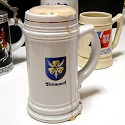
Commander in Chief of the Kriegsmarine Minutes of the Conferences at the Führer Headquarters from 10 to 12 September 1943.
10 SEPTEMBER 1943. 1230. Report on the Situation in Presence of the Führer. In the course of the report:
b. The Commander in Chief, Navy, reports on the submarine situation and the plans for submarine warfare. Fewer U-boats have been lost since the Hagenuk device was introduced and the Metox switched off. Conditions for sending out submarines have definitely improved. Operations against convoys in the North Atlantic will begin again with the advent of the new moon in September. An attempt will be made to take the enemy by surprise. Difficulties may be encountered in locating the convoys. It will be a hard fight in spite of our new weapons (anti-aircraft guns, anti-destroyer torpedo). There is no doubt that enemy defense measures will rapidly be brought back to previous strength. c. The Commander in Chief, Navy, reports on the defensive use of mines with new fuses. The coastal areas where landings might be attempted are too extensive and the available number of mines is too small to permit the laying of defense barrages. Besides, such mine fields are intolerable because our own movements would be severely curtailed. Defensive mine barrages will therefore be laid only when the direction of the enemy thrust is known. An exception will be made in mining the Vergoyer Bank. Until the time is ripe for the laying of defensive mine fields it will be wiser to conserve the mines on hand for offensive uses. d. The Commander in Chief, Navy, reports that he plans to use the Italian submarine crews under Grossi to man patrol vessels and motor torpedo boats.
b. Anti-Aircraft Defenses in Toulon. The Reichsmarschall is aware of the importance of reinforcing the Toulon anti-aircraft defenses and will do what he can although there are serious difficulties which must be overcome. The question is put whether the German Navy would also want German batteries from the Italian area. (On 12 September Oberst Christian endorsed the delivery of four batteries which the Navy had requested.) The Commander in Chief, Navy, lunched and dined with the Führer.
11 SEPTEMBER 1943. 1145. Discussion of personnel problems with Field Marshal Keitel.
b. Keitel requests an investigation of the number of Navy personnel in Rumania, Bulgaria (and possibly Greece) where, in his opinion, many German soldiers might be relieved by Bulgarian or Rumanian personnel. Besides that, the necessity of maintaining the "Musicians Corps in Sofia" and some "500 young men of a Navy motor pool in Holland" should be investigated (General von Unruh). The Commander in Chief, Navy, has lunch with the Führer. The Commander in Chief, Navy, discusses with the German Foreign Minister [von Ribbentrop] the problem of how the French Fleet is to be treated after Italy ceases to be a political factor. Subsequently this problem is also taken up with the Führer. The Führer is of the opinion that latest events have definitely freed France of her rival in the Mediterranean i.e. Italy. This might possibly result in an increasingly rigid French attitude. Therefore caution should be exercised in dealing with France. The German Foreign Minister emphasized that he is aware of the interest which the Commander in Chief, Navy, has in the careful treatment of the French Navy since their cooperation is of vital importance to Germany. He promises to keep this in mind. He does not consider it appropriate to extend special favors at this time, but he will be careful to avoid cause for friction with the French Navy. The Commander in Chief, Navy, does not plan for the present to take any steps regarding a declaration of honor to Admiral de Laborde (who was recently arrested by the Gestapo and then released again, Tr.N.) or the creation of a "Flotte Symbolique". Between 2000 and 2330. The Commander in Chief, Navy, and the officers in his company are guests of the Reichsführer SS and German Minister of the Interior, Himmler.
12 SEPTEMBER 1943. 1230. Report on the situation in the presence of the Führer. Naval matters were not discussed. By Order of the Commander in Chief of the Kriegsmarine:
[Chief of the Seekriegsleitung, Operations Division]
|
 BOOK: The Battleship Bismarck. The Complete History of the Ship.
 Naval & military gifts
|
